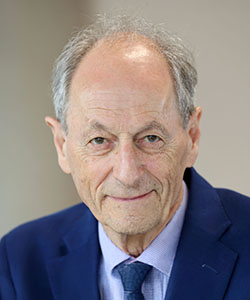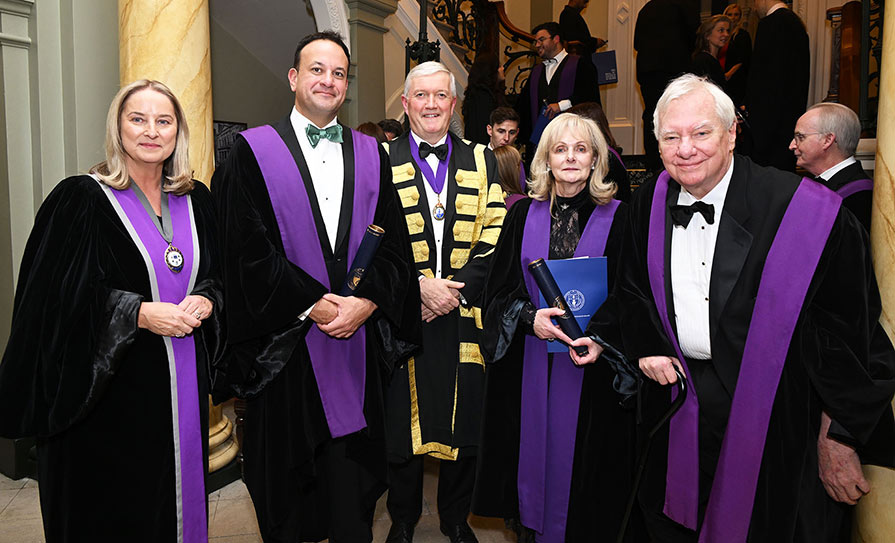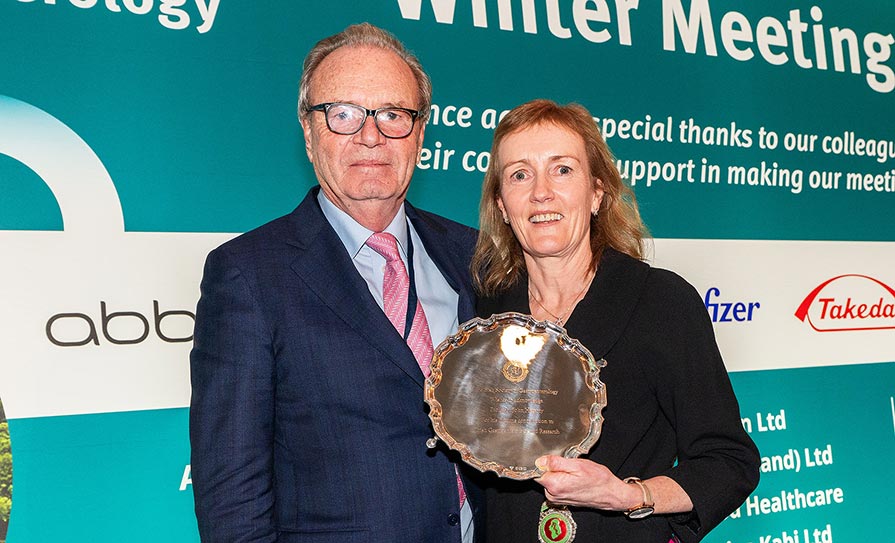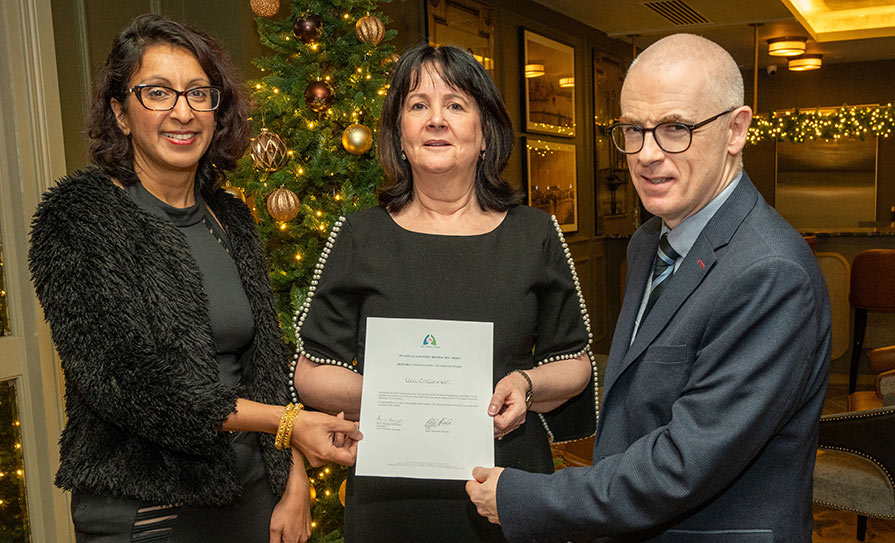The recent Autumn Conference of the RCPI Faculty of Paediatrics discussed health inequalities and their social determinants
The RCPI Faculty of Paediatrics recently held its Autumn Conference. One of the main focuses of the meeting was health inequalities and the social determinants of health. Over 200 paediatricians joining this important conversation.

Among the speakers was Sir Prof Michael Marmot, Professor of Epidemiology and Public Health at University College London, UK. Sir Prof Marmot was presenting at a session titled ‘Poverty and disadvantage in childhood’, which included contributions from Prof Susan Smith, Professor of General Practice at Trinity College Dublin, and former Taoiseach, Deputy Dr Leo Varadkar.
In the 1980s Sir Prof Marmot – then a breakout name in English epidemiology – led a groundbreaking investigation called the Whitehall Studies. Sir Prof Marmot drew revelatory connections between people’s life expectancy and social status.
He had previously conducted research at the University of California, Berkeley, US, where he compared the heart disease rates of Japanese people living in Japan and California. It was found that as individuals migrated across the Pacific Ocean to the US, their rates of heart disease would increase. His hypothesis was that Japanese society had stress-reducing devices, with a well-organised and clear social hierarchy, whereas American society was constantly in flux.
Whitehall Studies
In the Whitehall Studies, Sir Prof Marmot explored the mortality of people working in the British civil service. It was found that people working in lower job grades (messengers, doorkeepers, etc) had greater prevalence of risk factors such as smoking, reduced leisure time, higher blood pressure, and shorter height. They had a mortality rate that was three times higher than administrators working in higher grades in the civil service. The research attracted significant attention; in the UK’s New Year Honours list in 2000, he was knighted by Queen Elizabeth II for services to epidemiology and the understanding of health inequalities.
Since then, Sir Prof Marmot has served as Chair of the World Health Organisation Commission on Social Determinants of Health, which supports countries and global health partners to address social factors leading to health inequalities. He has written two books – Status Syndrome, combining research studies and personal experiences to show that health is linked to socio-economic status; and The Health Gap, a study that examines several relatively rich countries to expose links between poor health and poverty.
“If you want to reform your healthcare system, you have to pay attention to the social determinants of health, to the conditions that make people sick in the first place,” he told the meeting. In his presentation titled ‘Health inequalities, children, and young people’, he painted a stark picture of how life expectancy has been declining since 2010.
“Life expectancy had been improving about one year, every four years. After 2010, that rate of improvement slowed dramatically. From 2010 to 2022, life expectancy did not improve at all. I cannot think of another period during peace time when, over 13 years, life expectancy did not improve. The situation in Ireland was not terribly different,” he said.
Austerity
The start of that decline coincided with the onset of government austerity policies following the recession of 2007-2009. In recent years, the English government claimed they had made progress in taking children out of poverty. Sir Prof Marmot disagrees: “Look at destitution,” he said.
He used English philanthropist Joseph Rowntree’s definition of “destitution” as doing without two or more of six basics: Housing, heat, light, food, clothing, and toiletries.
Displaying research by the Joseph Rowntree Foundation, Sir Prof Marmot showed that UK children living in destitution had increased from 400,000 in 2017 to one million in 2022.
Several such studies were woven into his presentation, making one vivid picture. For instance, research by UNICEF Innocenti compared child poverty rates among Organisation for Economic Co-operation and Development (OECD) countries from the early years of the 2010s to the end of that decade. Out of 39 countries, the UK was found to have the biggest increase in child poverty.
There were other signs of decline. Quoting research that measured the average height of five-year-olds, which was conducted by NCD Risk Factor Collaboration, Sir Prof Marmot showed that UK children are shorter now than they were pre-austerity. Comparatively, the Netherlands has seen a consistent increase in height.
“The gap is getting bigger. What could be more important than feeding our children so that they grow?” he said.
The situation in the UK was shown as acute compared to other countries. Drawing on analysis by Financial Times’ Chief Data Reporter John Burn-Murdoch, Norway was seen as a country where even the median household enjoys high living standards. In the UK, the poorest households rank low compared to most countries.
“In other words, the UK is a poor country with a few rich people,” said Sir Prof Marmot.
A wider sense of despair seems to be sinking in with populaces. The analytics firm Gallup surveyed people from several countries asking: “Do you think children today will have a better, worse, or roughly the same life as you?”
Only 31 per cent of people in the UK thought they would have a better life. “My goodness, I’m a baby boomer,” said Sir Prof Marmot. “If you’d asked our parents will… your children have a better life than you, overwhelmingly they would have said yes.
“Now, only in [less] than one-third of European countries are parents saying that our children will have a better life than us. We really haven’t done this very well,” he said.
The intergenerational equity was represented in OECD research analysing how many generations it would take individuals to go from low- to middle-income. In the UK, it would take five generations.
‘Marmot Places’
“A common question I get asked is, ‘Why are you not depressed?’” stated Sir Prof Marmot. He said he is heartened by the growth of the ‘Marmot Places’ – a collaboration between University College London’s Institute of Health Equity and local authorities. Having “Marmot Place” status means embedding a social determinant-led approach to health, strengthening partnerships between services and communities, and introducing monitoring on health inequities.
Nearly 50 local authorities have obtained Marmot Place status. “It is really exciting,” he said. “These places are in financial trouble, but they haven’t said ‘there’s nothing we can do’. They’ve said, ‘we want to work with you.’ We’ve tapped into something. I used to say that I was optimistic, but now I say I’m hopeful.”
Sir Prof Marmot’s presentation was one of several focussing on child poverty at the conference held by the RCPI Faculty of Paediatrics. The conference’s annual Ralph Counahan Lecture – named after the important Irish paediatrician – was delivered by Prof Laura Viani, Consultant Otolaryngologist and Neuro-Otologist, Beaumont Hospital, Dublin. Three individuals were conferred with an honorary RCPI Fellowship: Prof Viani, Deputy Dr Varadkar, and Dr Richard O’Reilly, former Chair of the Department of Paediatrics at Memorial Sloan Kettering Cancer Centre, New York, US.













Leave a Reply
You must be logged in to post a comment.